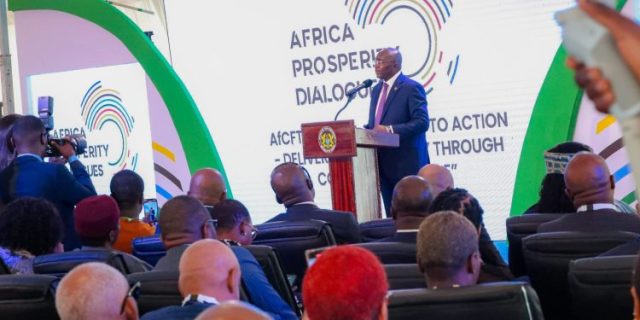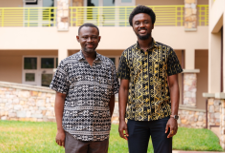Vice president Dr. Mahamudu Bawumia has disclosed that Africa will need between US$130 billion and US$170 billion annually to propel a sustainable growth of 5 percent in order to bridge the infrastructural shortfalls of the continent.
Addressing a high-level conference in Accra of African Ministers of State, diplomats, policymakers, and business executives, who are discussing ways of fast-tracking the implementation of the AfCFTA, Dr. Bawumia said even though the AfCFTA has set the stage for the transformation of Africa, its full prospects can only be realised through decisive steps by key African stakeholders, and a focus on some key broad areas he proposed.
Mr. Bawumia intimated that the continent should make conscious efforts to address the infrastructural deficit needed to facilitate the implementation of the AfCFTA which will likely come at a cost not less than US$130 billion a year.
“Africa needs between US$130 billion and US$ 170 billion annually to bridge its infrastructure gap and generate sustainable growth at 5% per annum or more. This presents immense opportunities for the private sector investment,” he noted.
The Vice President stressed that the “full prospects of AfCFTA can only be realised through decisive steps by key African stakeholders” and proposed three areas to focus on to realise the full prospects of the continent’s foremost trade agreement.
“To bring about the transformation we need, I propose three broad areas that we need to prioritise,” he told the audience.
“First is the need for smart investments in critical infrastructure. As a continent, we need to produce and trade our way out of poverty and underdevelopment, and we cannot do that without investing in smart infrastructure across the continent. While the last decades have seen some positive investments, there is the need for additional resources to finance the ‘arteries for trade’, which include the physical infrastructure such as roads, rail, and energy; digital infrastructure such as data centres to facilitate the digital transformation and financial infrastructure to allow for integration of financial markets.”
He also proposed “unleashing the productive capacities across the continent.”
“We must create platforms for knowledge brokerage and access to information on critical products and services on the continent to allow 445 million small businesses across the continent to plug into the value chains of these mega industries. We need to develop Africa into a manufacturing zone that will facilitate the trade of value-added products. These, in my view, will be critical to leapfrog Africa’s industrialisation and the enormous socio-economic benefits.”
“Attracting private sector participation through Public-Private Partnerships (PPPs) is, therefore, essential for the delivery of various infrastructure projects. Furthermore, there is a need for innovative policies to mobilise and allocate resources more effectively, and for better coordination amongst all African stakeholders and international partners.”

He was optimistic that if the continent is able to adopt and implement the proposals, AfCFTA would create greater opportunities for Africa to enable a reversal of the economic woes on the continent.
“As growing economies, we often struggle to attract much-needed investments. However, with the collaborated strength from all fifty-five (55) member states, with a population of 1.2 billion, the majority of whom are young, and a GDP of US$ 2.5 trillion, making Africa the eighth (8th) largest economy in the world, this positions Africa as an attractive investment destination. With the right investment, we will be able to sustain economic growth and create the job opportunities that the continent desperately needs.
“The AfCFTA is a real game-changer, and once fully realised, we can increase intra-African trade by some US$ 35 billion and reduce external imports by some US$ 10 billion annually.”
















